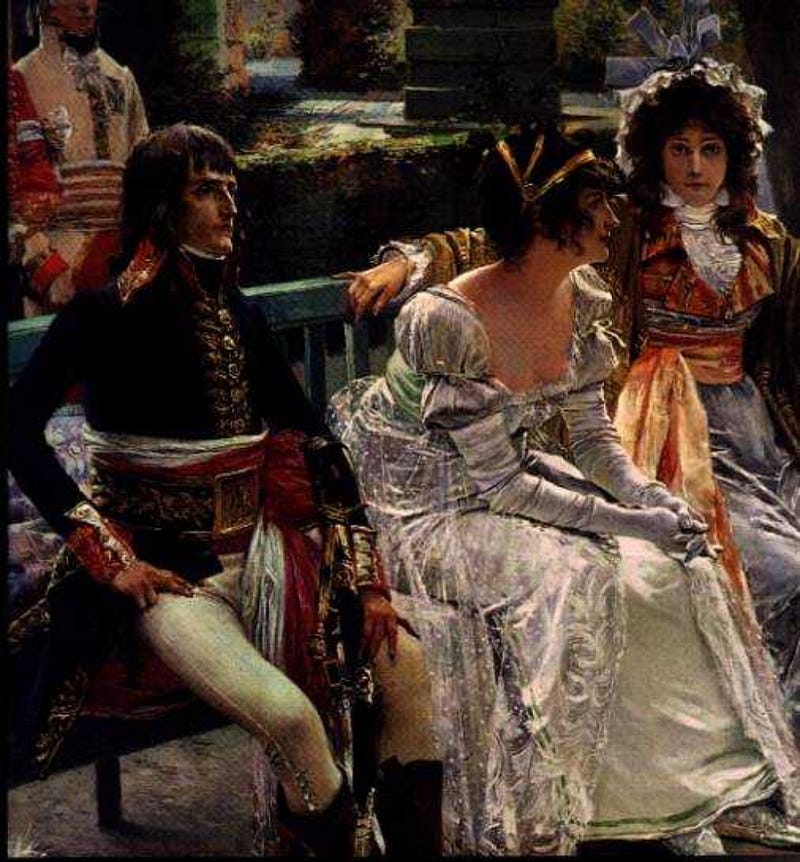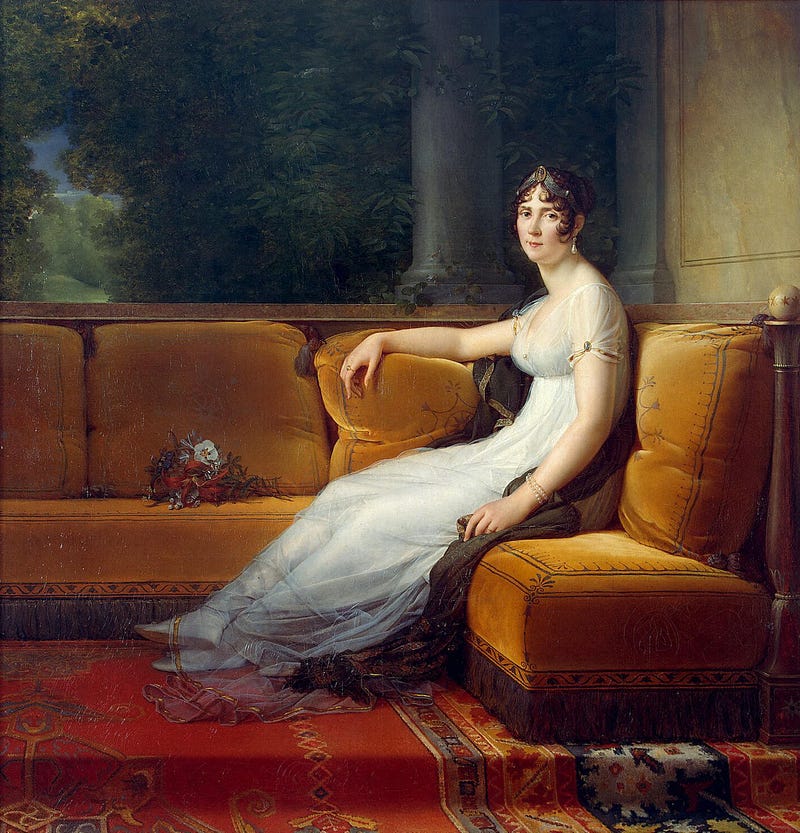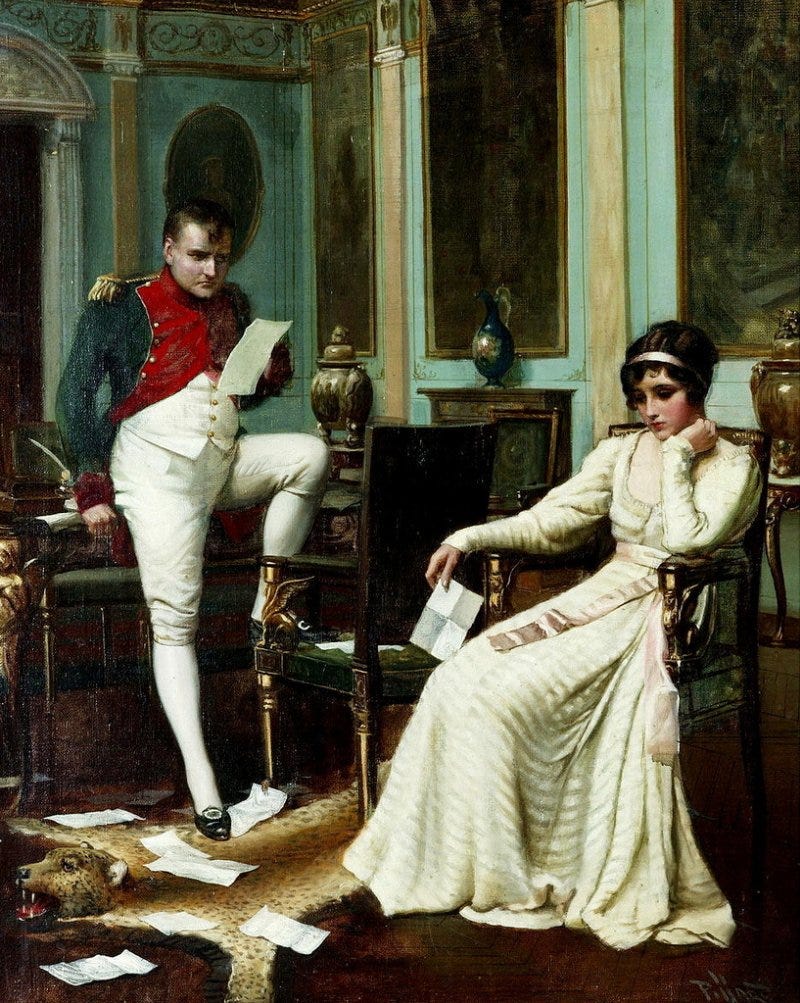Was Napoleon the Most Jilted Lover of the 1700s?


February 1796
“What an extraordinary influence you have over my heart. Are you Vexed? Do I see you sad? Are you ill at ease? My soul is broken with grief and there is no rest for your lover. But is there more for me when, delivering ourselves up to the deep feelings which master me, I breathe out upon your lips, upon your heart, a flame which burns me up…”
Oh, the heart-wrenching words of a man in love. Can’t you just feel the passion? The woman who received this must have felt pretty special. How happy she must have been to be the object of his yearning. Why, with a man like that she probably got flowers and chocolate all the time. Maybe he even cooked for her — and then cleaned up when he was done.
But what if she didn’t appreciate what she had? What if this man’s beloved saw him as nothing more than a tool for survival and worldly comfort? And what if the poor man didn’t even realize the depths of her deception until it was too late? You’d sure feel sorry for a guy like that.

March 14, 1796
“Every moment separates me further from you, my beloved, and every moment I have less energy to exist so far from you. You are the constant object of my thoughts…”
Would it change the story if you knew the writer was one of the greatest political figures of the 1700s? A guy that can build his own empire, dominate Europe, and write good love letters must certainly be a great catch. Well, I guess it depends on your perspective. If you were Marie Josephe Rose de Beauharnais and the guy writing you was Napoleon Bonaparte, it’s possible you might have mixed feelings.
Rose, or Josephine as she would later be known, met General Bonaparte at a party hosted by Paul Baras in 1795. Barras was not only one of the top dogs in France, he was also Rose’s lover.
Funny thing about guys who take lovers — they tend to bore easily. Having a mistress can be an expensive hobby don’t you know, and Rose was particularly expensive.
Apparently too expensive.
Barras pawned off his mistress to the scrawny General who immediately fell madly in love.

April 1796
“My unique Josephine, away from you there is no more joy, away from you is a wilderness in which I stand alone and without experiencing the bliss of unburdening my soul. You have robbed me of more than my soul; you are the one only thought of my life…To live for Josephine, that is the history of my life. I am struggling to get near you, I am dying to be at your side…I know not what fate awaits me, but if it keeps me much longer from you it will be unbearable, my strength will not last out”
Unfortunately, Josephine was an unscrupulous woman. Living through the revolution and surviving the Reign Of Terror had hardened her heart.
Napoleon was no good looker. He was thin, with a short blunt haircut and his complexion was dull and sickly. The affections she bestowed on her paramour were a cold calculation. Better to be the mistress of an unattractive general than to go without life’s little luxuries after all.
Now in her 30s, she knew her luck with lovers would soon come to an end. Therefore, when Napoleon proposed marriage she accepted. The couple married in March 1796.

April 1796
“I have gazed steadfastly on the most incredible misfortunes without a wrinkle on my brow or a vestige of surprise: but today, the thought that my Josephine might be ill, and above all the cruel, the fatal thought that she might love me less, blights my soul, stops my blood, makes me wretched and dejected, without even leaving me with the courage of fury and despair. I often used to say that men have no power over him who dies without regrets, but today to die without your love, to die in uncertainty of that is the torment of hell, it is a lifelike and terrifying figure of absolute annihilation. I feel passion strangling me.”
A few days after their wedding, Napoleon went on campaign in Italy. He began writing almost daily letters in which he confessed his wholehearted devotion to his new wife. Josephine took advantage of his absence by attending balls and parties and taking on a series of lovers. She wrote to her husband only when pressed and made every excuse to avoid visiting him.
November 27, 1796
“I go to Milan; I fling myself into your room; I left all in order to see you, to clasp you in my arms… you were not there. You gad about the towns amid junketing; you run farther from me when I am at hand; you care no longer for your dear Napoleon. A passing fancy made you love him, fickleness renders him indifferent to you…the ill luck that I now suffer is past all calculations…don’t alter your plans, have your fling of pleasure, happiness was invented for you. The whole world is only too happy if it can please you, and only your husband is very, very, unhappy.”
Although many in his command knew of the indiscretions of his wife, Napoleon was oblivious until his campaign in Egypt in 1798. Once the extent of her unbecoming conduct was revealed everything changed. His broken heart was unmendable.

February 19, 1797
“Not a word from you what on earth have I done? To think only of you, to love only Josephine, to live only for my wife, to enjoy happiness only with my dear one, does this deserve such harsh treatment from her? My dear, I beg you, think often of me, and write me every day. You are ill, or else you do not love me! Do you think then, that I have a heart of stone? And do my sufferings concern you so little? You must know me very ill. I cannot believe it. You to whom nature has given intelligence, tenderness and beauty, you who alone can rule my heart, you who doubtless know only too well the unlimited power you hold over me! Write to me, think of me, and love me. Yours ever, for life.”
Ironically, when Josephine realized Napoleon knew everything she decided she really loved him after all. Completely transformed, she tried to be a model wife, but to no avail. The tables turned, Napoleon took a lover, and Josephine became the jealous spouse. Their relationship continued, but the love letters came no more. In their place were sterile summaries of Napoleon’s conquests and brief comments on his health.
Napoleon finally divorced Josephine in December 1809 due to Josephine’s inability to conceive. Could they have eventually made their marriage work? Who knows. He must have loved her to the end despite all they went through, and she must have loved him. Each, at the end of their lives, uttered the other’s name with their dying breath.
“It is sad when one and the same heart is torn by such conflicting feelings for one person…I need to be alone. I am tired of grandeurx; all my feelings have dried up. I no longer care about my glory. At 29 I have exhausted everything.”
Sources
https://archive.org/stream/napoleonsletters00napoiala/napoleonsletters00napoiala_djvu.txt
https://www.pbs.org/empires/napoleon/n_josephine/emperor/page_1.html


Alan Asnen | 17th Oct 19
Ah, Nicol, to have been one of your home-schoolers! What a treat to have grown up with this wealth of knowledge and your enthusiasm.
nicolvalentin | 18th Oct 19
Ahh, thanks Alan. 🙂